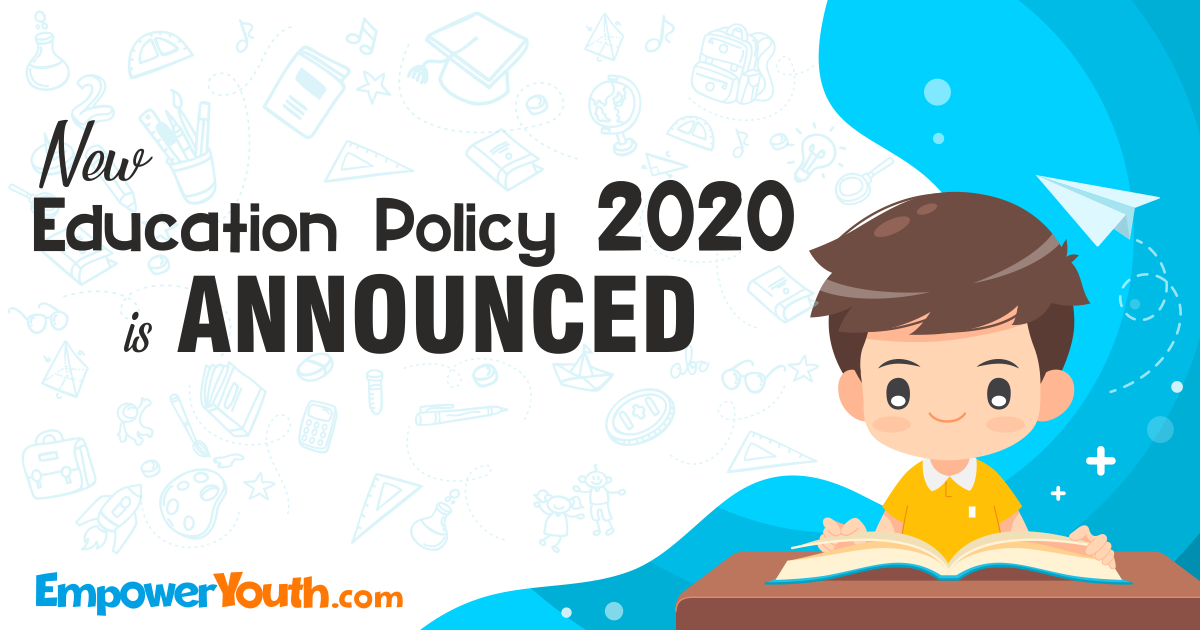The New Education Policy 2020 - is announced
 NEW DELHI: The Union Cabinet on Wednesday embraced the New Education Strategy (NEP). One of the noteworthy decisions, the Cabinet has renamed the Service of Human Asset and Improvement (MHRD) as the Service of Instruction.
“The Head administrator Mr. Narender Modi, supervise the cabinet meeting,” said I&B Pastor Prakash Javedkar.
The decision of changing the name of the administration was finished by the proposition recorded in the draft on another preparation game plan, which prescribed it to bring the accentuation back on guidance and learning.
NEW DELHI: The Union Cabinet on Wednesday embraced the New Education Strategy (NEP). One of the noteworthy decisions, the Cabinet has renamed the Service of Human Asset and Improvement (MHRD) as the Service of Instruction.
“The Head administrator Mr. Narender Modi, supervise the cabinet meeting,” said I&B Pastor Prakash Javedkar.
The decision of changing the name of the administration was finished by the proposition recorded in the draft on another preparation game plan, which prescribed it to bring the accentuation back on guidance and learning.
"As on date, we have various standards for central and deemed universities for various individual standalone institutions. New Instruction Strategy says that for reasons of significant worth, principles will be the equivalent for all and not as indicated by the ownership," said Amit Khare, Advanced training Secretary.
New Education Policy: Highlights
Outcomes of NEP 2020
* Universalisation from ECCE to Secondary Education by 2030, lining up with SDG4"
* Attaining Foundational Learning and Numeracy Skills through National Mission by 2025
* 100% Gross Enrolment Ratio (GER) in Pre-School to Secondary Level by 2030
* Teachers to be set up for evaluation changes by 2023
* Inclusive and Equitable Education System by 2030
* Board Exams to test center ideas and utilization of information
* Every youngster will come out of School proficient in any event one Skill
* Common Standards of Learning in Public and Private Schools
Major Reforms: School Education
*Board tests will be low stakes and test genuine information rather than repetition learning.
*Mother tongue to be a mechanism of guidance till fifth grade.
*Report cards will be a far-reaching report on abilities and capacities rather than just stamps and explanations.
*National strategic spotlight on essential proficiency and fundamental numeracy.
*Major changes in the educational structure of the educational program with no unbending division between streams.
*All detachments among professional and scholarly and curricular and extra-curricular will likewise be removed.
* New National Curriculum Framework for ECE, School, Teachers and Adult Education
* Board Examination will be Low Stakes, Based on Knowledge demand.
* Medium of Instruction till at any rate Grade 5, and ideally till Grade 8 and past in Home Language/Mother tongue/Regional Language
* 360-degree Holistic Progress Card of Child
* Tracking Student Progress for Achieving Learning Outcomes
* National evaluation community - PAREKH
* NTA to offer ordinary Entrance Exam for Admission TO HEIs
* National Professional Standards for Teachers (PST)
* Book Promotion Policy and Digital Libraries
* Transparent online self-exposure for open oversight and responsibility
* Universalization of Early Childhood Care Education (ECCE)
* National Mission on Foundational Literacy and Numeracy
* 5+3+3+4 Curricular and Pedagogical Structure
* Curriculum to coordinate 21st Century Skills, Mathematical Thinking, and Scientific temper
* No Rigid Separation between Arts and Sciences, among Curricular and extra-Curricular exercises, among Vocational and Academic streams
* Education of Gifted Children
* Gender Inclusion Fund
* KGBVs up to Grade 12
* Reduction in Curriculum to Core Concepts
* Vocational joining from Class 6 onwards
Use of Technology
* Use of Technology in Education Planning
* Teaching Learning and Assessment
* Administration and Management
* Regulation-Self Disclosure and Minimum Human Interface
* Increasing Access for Disadvantaged Groups
* Divyang Friendly Education Software
* e-Content in Regional Language
* Virtual Labs
* National Educational Technology Forum (NETF)
* Digitally Equipping Schools, Teachers and Students
* Graded Autonomy: Academic, Administrative and Financial
* Phasing out Affiliation System in 15 years
* National Mission on Mentoring
* Independent Board of Governors (BoG)
* Single Regulator for Higher Education (barring Legal and Medical)
* On-line Self Disclosure based Transparent System for Approvals instead of 'Reviews'
* Common Norms for Public and Private HEIs
* Private Philanthropic Partnership
* Fee obsession inside Board Regulatory Framework
* Public Investment in Education Sector to arrive at 6% of GDP at the earliest
Major Reforms: Higher Education
* Half Gross Enrolment Ration by 2035
* Holistic and Multidisciplinary Education-Flexibility of Subjects
* Multiple Entry/Exit
* UG Program - 3 or 4 years
* PG program - 1 or 2 years
* Integrated multi-year bachelor's/Master's
* M Phil to be stopped
* Credit Transfer and Academic Bank of Credits
* Higher Education Interest Section(HEIs): Autonomous Degree-Granting College and Research/teaching Intensive Universities
*Model Multidisciplinary Education and Research University (MERU)
* The current Education Policy was embraced in 1986 which have been proceeded till date that is for most recent 34 years
* The nation got the training strategy following 34 years
* The Union Cabinet, led by the PM himself, has affirmed the draft of National Education Policy today morning.
* The Cabinet has additionally acknowledged the proposition of changing the name of MHRD to Education Ministry.
* The vision of making instruction framework that contributes straightforwardly to changing the nation, giving top notch training to all, and making India a worldwide information superpower.
Comments
An excellent digital marketing & social media practitioner with over 3 years' experience in
digital marketing. Done Certified diploma (Computer application, web
design (specialization in WordPress), project management, and digital marketing. A certified AdWords and
SEO Professional.
Working Recently as a Digital Marketing Manager in DSB Law Group.







